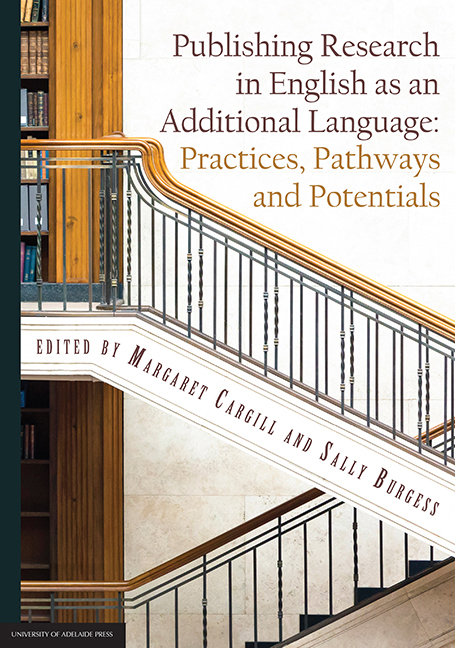Book contents
- Frontmatter
- Contents
- List of contributors
- Acknowledgements
- Foreword
- Introduction: Unpacking English for Research Publication Purposes [ERPP] and the intersecting roles of those who research, teach and edit it
- 1 Accept or contest: A life-history study of humanities scholars’ responses to research publication policies in Spain
- 2 Introducing research rigour in the social sciences: Transcultural strategies for teaching ERPP writing, research design, and resistance to epistemic erasure
- 3 Blurring the boundaries: Academic advising, authors’ editing and translation in a graduate degree program
- 4 The delicate art of commenting: Exploring different approaches to editing and their implications for the author-editor relationship
- 5 The CCC Model (Correspondence, Consistency, Correctness): How effective is it in enabling and assessing change in text-editing knowledge and skills in a blended-learning postgraduate course?
- 6 How credible are open access emerging journals? A situational analysis in the humanities
- 7 Disseminating research internationally: Intra-subdisciplinary rhetorical structure variation in immunity and allergy research articles
- 8 Scientists publishing research in English from Indonesia: Analysing outcomes of a training intervention to inform institutional action
- 9 ‘The one who is out of the ordinary shall win’: Research supervision towards publication in a Chinese hospital
- 10 The geopolitics of academic plagiarism
- 11 Training ‘clerks of the [global] empire’ for 21st-century Asia? English for Research Purposes (ERP) in Vietnam
- 12 Standardisation and its discontents
- Reflections and future directions in publishing research in English as an Additional Language: An afterword
Introduction: Unpacking English for Research Publication Purposes [ERPP] and the intersecting roles of those who research, teach and edit it
Published online by Cambridge University Press: 16 March 2018
- Frontmatter
- Contents
- List of contributors
- Acknowledgements
- Foreword
- Introduction: Unpacking English for Research Publication Purposes [ERPP] and the intersecting roles of those who research, teach and edit it
- 1 Accept or contest: A life-history study of humanities scholars’ responses to research publication policies in Spain
- 2 Introducing research rigour in the social sciences: Transcultural strategies for teaching ERPP writing, research design, and resistance to epistemic erasure
- 3 Blurring the boundaries: Academic advising, authors’ editing and translation in a graduate degree program
- 4 The delicate art of commenting: Exploring different approaches to editing and their implications for the author-editor relationship
- 5 The CCC Model (Correspondence, Consistency, Correctness): How effective is it in enabling and assessing change in text-editing knowledge and skills in a blended-learning postgraduate course?
- 6 How credible are open access emerging journals? A situational analysis in the humanities
- 7 Disseminating research internationally: Intra-subdisciplinary rhetorical structure variation in immunity and allergy research articles
- 8 Scientists publishing research in English from Indonesia: Analysing outcomes of a training intervention to inform institutional action
- 9 ‘The one who is out of the ordinary shall win’: Research supervision towards publication in a Chinese hospital
- 10 The geopolitics of academic plagiarism
- 11 Training ‘clerks of the [global] empire’ for 21st-century Asia? English for Research Purposes (ERP) in Vietnam
- 12 Standardisation and its discontents
- Reflections and future directions in publishing research in English as an Additional Language: An afterword
Summary
Regardless of where academics work or which languages we use, the pressures to publish in English are considerable and now extend to all disciplines. Gaining an understanding of the multiple roles that English performs and its place in academic publishing has therefore become a major concern for many researchers. The statistics supporting the dominance of English as the language of academic publication worldwide are well reported (for example, Ferguson, 2007; Swales, 2004). Yet, as the numbers of new authors submitting articles to journals grow, new cohorts of editors and reviewers meet issues of variation across the full range of lexico-grammatical, socio-pragmatic and discoursal dimensions. The variable nature of the texts submitted for publication affects the practices of these editors and reviewers in subtle and profound ways. Most know little of the debates that have been conducted around this situation over many years in the field of applied linguistics and its related disciplines, and may often regard language as a transparent conduit for the researcher's meaning (Lillis & Curry, 2015). The remedy commonly recommended by the journal publishers is the use of an editing or language polishing service, now, for those able to pay the fees, increasingly just a click away on the journal's website.
But does a ‘quick fix’ of this kind adequately address the wide range of issues arising from the use of a variety of academic English perceived as non-standard? We would argue that it does not, and that the expanding field of research and practice in academic publication has much to contribute to a better understanding of the complexities. The chapters in this volume represent work from established and emerging scholars and practitioners involved in investigating the interconnections between linguistically and culturally diverse authors, published research texts, processes for supporting the production of the texts, the social conditions surrounding publication, and critical investigation and reflection on the current trends in all these areas. The chapters developed as a result of a fruitful conjunction of two related groups which held overlapping conferences in 2015 in Coimbra, Portugal: PRISEAL [Publishing and Presenting Research Internationally: Issues for Speakers of English as an Additional Language] and MET [Mediterranean Editors and Translators].
- Type
- Chapter
- Information
- Publishing Research in English as an Additional LanguagePractices, Pathways and Potentials, pp. 1 - 12Publisher: The University of Adelaide PressPrint publication year: 2017

